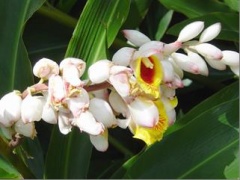Difference between revisions of "Ginger, Shell ginger, Torch ginger"
(Created page with "{{Infobox_Other_organic | image = Ginger_shell_ginger.jpg | origin = - | stowage factor = - | humi...") |
m (→Special Considerations) |
||
| (2 intermediate revisions by 2 users not shown) | |||
| Line 26: | Line 26: | ||
<br><br><br> | <br><br><br> | ||
<b>Sources used</b><br> | <b>Sources used</b><br> | ||
| − | BMT | + | BMT Consolidated Manual on (Dutch) [[Flower Bulbs]], cut flowers/greens and potted [[plants]]. |
| + | |||
| + | [[Category: Products]][[Category: Perishables]] | ||
Latest revision as of 11:04, 14 January 2021
| Infobox on Ginger, Shell ginger, Torch ginger | |
|---|---|
| Example of Ginger, Shell ginger, Torch ginger |  |
| Facts | |
| Origin | - |
| Stowage factor (in m3/t) | - |
| Humidity / moisture | - |
| Ventilation | - |
| Risk factors | See text |
Ginger, Shell ginger, Torch ginger
Contents
Description / Shipment / Storage / Risk factors
Scientific Name and Introduction
Alpinia zerumbet, Alpinia purpurata. The ginger flowers represent a range of species and genera from the tropics that include the plants producing the edible ginger rhizome. One of the common lei flowers used in Hawaii is white-ginger. Torch ginger flowers are spectacular spikes of red flowers that give an especially tropical impact in arrangements. The genus is named after the Italian botanist Prosper Alpinus.
Quality Characteristics and Criteria
No specific maturity standards have been developed for these flowers. They are normally harvested when all flowers on the spike are open. Make sure flowers do not exhibit chill damage symptoms such as off-coloured (greyish/bluish) blooms.
Grading and Bunching
There are no specific grade standards for gingers. Proper maturity and freedom from flower and foliage defects would be important indicators of quality. Gingers are large flowers and are therefore normally packed individually. Some species may be individually sleeved to protect the delicate petals.
Ethylene Sensitivity
These flowers do not appear to be particularly sensitive to ethylene.
Pretreatments
There is no evidence that pre-treatments provide any benefit to ginger flowers.
Storage Conditions
Store at 12,5°C to 15ºC. Gingers are chilling sensitive, so they must be held at warmer temperatures.
Packing
Gingers are packed flat in standard or insulated fibreboard boxes.
Special Considerations
Their large size makes them difficult to manage. Since insects sometimes make the trip from grower, wholesaler to retailer, make sure flowers are inspected and any insects removed.
Sources used
BMT Consolidated Manual on (Dutch) Flower Bulbs, cut flowers/greens and potted plants.











